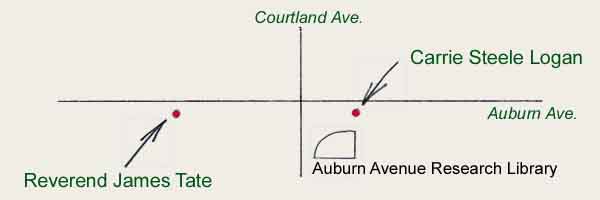 |
|
| Reverend James Tate, Entrepreneur ? - 1897 |
|
| Cast bronze relief sculpture, unique, height=27"
Commissioned by the Corporation for Olympic Development in Atlanta (CODA) |
|
| Belief in the Future
Reverend James Tate was born a slave and was the property of a plantation owner in Elbert County, Georgia, who was also Tate's father. Theirs' was an unusual relationship because his owner saw to James Tates' secret education. This was a serious offense since illiteracy was key to controlling slaves and preventing escape. James Tate was 39 years of age when slavery was abolished. Armed with his education he was prepared for his long overdue test as a free man. I suspect that he had much to prove. James Tate arrived in Atlanta in the 1860's, opened two grocery stores and did a thriving business on Walton and Decatur Streets. It's difficult to imagine the times he was thrust into. Yes, they were free. But except for churches, African Americans had little or no access to the institutions that we now regard as essential. There were no schools. James Tate assisted in organizing the first school in Atlanta for African Americans, a school that used old abandoned railroad boxcars as classrooms. James Tate was one of the original founders of Friendship Baptist Church the birthplace of Spellman College. James Tate business flourished and he became one of Atlanta's five wealthiest African Americans during the 1870's. He also served as a sort of informal bank by providing business loans to people who could not secure commercial loans. James Tate "played an active role in Atlanta politics for two decades. In cooperation with Reverend Frank Quarles, James Tate established the Equal Rights Association in 1866. In 1870, James Tate ran for the Georgia Assembly. He delivered the black vote from Atlanta's Third and Fourth Wards to the Republican Party in the city council race and, in 1879, organized African American Republican Ward clubs. Tate died in 1897 and is buried in Atlanta's Oakland Cemetery." * James Tate is regarded by historians as "the father of black business in Atlanta". Tate grew up with people who believed in the future, people who didn't just break the law but shattered the law. They invested faith and trust in him. It makes sense that he established a school. It is no wonder that while some businessmen purchase hardened cynicism at the counters of commerce, James Tate was known for the faith and capital he invested in others. |
|
| *Taken from the bronze plaque provided by CODA, 1996 | |
| Reverend James Tate is one of four historic bronze relief sculptures by Brian R. Owens that are permanently installed at various points on Auburn Avenue in downtown Atlanta, not far from the Martin Luther King Center for Nonviolent Change. | |


